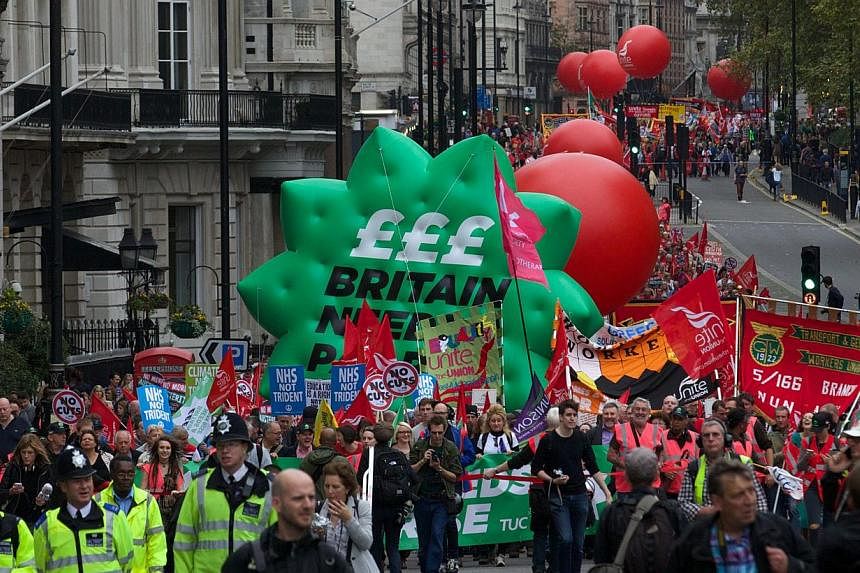LONDON (AFP) - At least 80,000 people marched through central London on Saturday to protest against low wages and public spending cuts introduced to reduce Britain's deficit, organisers said.
The Trades Union Congress (TUC), a federation of the country's main trade unions, said thousands more gathered in Glasgow and Belfast as part of the "Britain Needs A Pay Rise" event.
The demonstration capped a week of industrial action over low wages, that saw workers in the state-run National Health Service (NHS), courts, job centres and museums stage strikes.
Led by drummers, brass bands, stilt-walkers and members dragging sound systems, the demonstrators in London marched in a carnival spirit, gathering for a rally in Hyde Park before dispersing peacefully.
Organisers were calling on the government to take action to increase wages, which they say have slumped on average by £50 (S$103) a week in real terms since 2008.
"This is the worst I've known it," said Keith Martin, a 49-year-old labourer.
"Everyone in public services has been hammered for the last three or four years, I've had a 25 per cent pay cut and they're (the government) still not saving the money they need to save."
Ministers say they must continue with their austerity programme to balance Britain's books, and say they cannot afford the public sector pay rises requested by unions.
But TUC chief Frances O'Grady said workers were "fed up".
"They see top pay in the boardroom rocketing and they're saying it's about time we share the benefits of the recovery," she told AFP.
Their message was aimed at Conservative Prime Minister David Cameron, but union leaders also warned the opposition Labour party not to pursue "austerity-lite" policies.
Britain is enjoying enviable economic growth - the International Monetary Fund predicts 3.2 per cent this year and 2.7 per cent in 2015 - but the recovery has yet to deliver significant wage rises.
A recent study by the New Economics Foundation found that households had suffered a 15 per cent decline in their real incomes over the last year.
Meanwhile, the Institute for Policy Research reported that wages had failed to keep pace with inflation since 2008.
"Everybody seems to be working just to pay the bills and not really to live," said a 61-year old carer marching in London, who asked not to be named.
"Family life is going downhill. They are leaving the old and vulnerable without help they need."
But the British public has largely accepted the need to tighten the nation's belt, and both the Tories and Labour vow they will not radically increase spending if they win next year's general election.
Responding to Saturday's march, a spokesman for the Treasury department pointed to Britain's rate of unemployment, which at 6 per cent is its lowest since late 2008.
He also noted this month's rise in the national minimum wage - the first real terms increase since the recession - and said measures such as a reduction in income tax for low earners and a freeze on fuel tax were helping workers.
"The government's long-term economic plan is working," he said.
"The only sustainable way to raise living standards is to keep working through the plan that is building a resilient economy."

